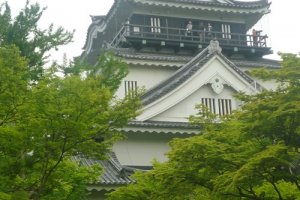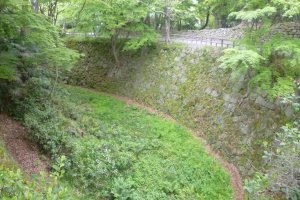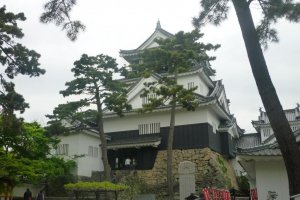Aichi Prefecture is the birthplace of heroes. The three most influential figures from the period of civil war were all born in Aichi, Oda Nobunaga and Toyotomi Hideyoshi in modern day Nagoya, and in nearby Okazaki Castle, the first of the 14 Tokugawa Shogun, the Great Lord, Ieyasu.
Okazaki Castle is the symbol of the city. Originally built in 1455 by the warrior Saigo Tsugiyori across the river where the nearby Myodaiji Temple now stands. Back then, the castle was more likely just a small wooden fort. Ieyasu’s grandfather, Kiyoyasu captured the fortress, and rebuilt Okazaki Castle on its present site in 1531, taking advantage of the Otogawa river and a tributary as a natural moat flowing below it. Over the years the castle was expanded and defensive elements developed and strengthened, becoming one of the nations most respected castles. It remained the bastion of the Tokugawa clan for over 350 years, and the seat of the Mikawa Tokugawa, one of the three main family lines throughout the Edo Period. (1603-1868)
Tokugawa Ieyasu was born in Okazaki Castle in 1542, at a time of great civil unrest. The Tokugawa, or Matsudaira as they were named then, controlled the rice rich Mikawa plains, a region much desired by the surrounding warlords, each of whom vied to take the lucrative lands. Ieyasu proved a wily leader and brilliant tactician. Maintaining and expanding his territories and power, he followed in the footsteps of the other two national unifiers, the Oda and Toyotomi, and in 1603, following the decisive Battle of Sekigahara, Ieyasu as victor was invested as Shogun, a title he made hereditary, allowing the Tokugawa family to rule Japan for the next 250 years.
During the Edo Period, Okazaki thrived due to it’s being an important castle town located along the Tokaido Highway, the major thoroughfare between the capital, Kyoto and Ieyasu’s stronghold, Edo (modern day Tokyo).
In 1868, Japan ended it’s feudal system, and eight years later abolished the samurai caste. In 1873, Okazaki Castle, like many other castles around the country, was demolished, leaving only the moat and the sturdy stone walls. The castle’s main keep, annex and well-house were reconstructed, although in ferro-concrete, in 1959.
The castle grounds are now a tree filled park, a popular cherry blossom and wisteria viewing spot in spring. Entry is via the striking Otemon gate. The remaining rough hewn stone walls are most impressive, their original harsh function as protector of a fortress now softened by the lush moss and ferns covering them. Within the grounds are a number of interesting statues of Ieyasu and a smaller one dedicated to Honda Tadakatsu, a loyal retainer of the Tokugawa. Prior to entering the central bailey, you’ll pass the oldest municipal Noh theatre in Japan. Various shrines, small eateries, an ancient teahouse and a well from which the great Lord, Ieyasu’s first bath was supposedly drawn can also be seen. There’s even a monument to the Alamo! Why? Well, you’re just going to have to go see for yourself!
Another attraction well worth visiting is the Ieyasu and Mikawa Bushi (warrior) Museum, (see the JapanTourist article devoted to this museum.)
During your visit, you may be lucky enough to catch the Great Ieyasu Aoi Busho Tai, a team of performing samurai wandering the grounds in full armor, or putting on an open air show.
The main attraction however is the castle keep. The reconstructed castles’ second, third and fourth floors have been converted into a fascinating museum, displaying samurai armor weapons, and items of daily use, explanations of local history and cultural exhibits too, while the fifth floor observatory offers a panoramic view of the Mikawa region. On exiting, the ground-floor souvenir stand invites a look in too.
Apart from Tokugawa Ieyasu and the castle, Okazaki is most famous for it’s fireworks. The Tokugawa government had restricted the manufacturing of gunpowder, and even now, some 70% of Japan’s fireworks are made in Okazaki. Every summer the castle grounds host a number of events and festivals, the most famous being the annual Fireworks Festival, when an amazing 30,000 fireworks are exploded in the night sky.
Okazaki Castle is an underrated tour destination, and with international interest in the samurai and Tokugawa Ieyasu growing, should be a must-see on your Japan tour.



































